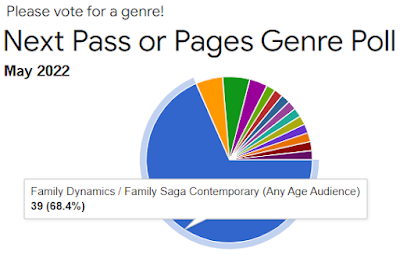In our writing series this month, we've been giving you some pointers on querying. Kara talked about
how Twitter can be a great resource for querying writers & Melinda gave you four
fabulous resources to help you on your quest. Today, I'm going to talk about one of my favorite things: spreadsheets.
We've given you
NaNo goal spreadsheets,
numerical motivation spreadsheets, and now, I give you:
THE AGENT RESEARCH SPREADSHEET! (download HERE)
Let's break it down:
Column A: AGENCY
Obviously, you're going to want to know what agencies you're querying. I've found it easiest to organize my spreadsheet alphabetically by agency.
Column B: AGENT
Here, I make a row for each agent at the agency who represents the genre(s) I'm interested in. Quite frequently, agents will move agencies; at that point, I just copy/paste that row to the new agency and make a comment (right click - "insert comment") to that effect.
Columns C-E: PREVIOUS QUERIES
If this is the first book you've sent out to agents, you can delete these. If you've queried previously (even if it was years ago!) here's where you keep track of who rejected at the query stage (
R) or after requesting a partial (
P) or full (
F). If the agent
has requested materials in the past, this is a great thing to mention in your query.
Columns F-I: GENRES
Here's where we get into the research portion of our spreadsheet. The first place I'd go to get your preliminary list is
Query Tracker.

Here, you can search for agents who represent the genres you're looking for. Keep the big picture in mind. Although some agents will represent books outside their usual genres for their existing clients, but in general, if you want to write both science fiction
and romance, for instance, an agent who has interest and experience in both those categories might be a better fit than those who represent just one. This is a great place to start compiling your list.
In my example to the left (cropped from my spreadsheet), I marked agents who represented commercial, science fiction, fantasy, and historical.
[Side note:
I recently ran across this fabulous
infographic that explains the differences between commercial, upmarket, and literary fiction. If you're not sure which of these large umbrellas your work fits under, it's definitely worth checking out!]
In my opinion, Query Tracker is the best place to
start your agent search. On the agents' individual pages, you can find links to their agency websites, blogs, twitter hashtag, interviews, etc. which can provide a plethora of useful information about them. Also, for $25/year, you can subscribe to the premium version and access a wealth of statistics and charts for each agent and set up lists for multiple projects.
Columns J-K: RECENT SALES
These next columns require you to dig a bit deeper. I'm talking about
Publishers Marketplace. This is a
fantastic resource for querying writers, but -- heads up! -- most information that I'll be talking about here requires a subscription. At $25/month it's an investment, but the information you'll find there is invaluable.
The first thing you'll want to check out is the
Dealmakers tab. Here you can search by genre to see the actual deals that agents have been making to publishers on behalf of their clients. The information here is submitted by agents themselves, so there may be omissions (some agents simply don't report their sales), but it's a great place to start if you're wondering who has connections with publishers and imprints.
After you click on the genre you'd like, PM will display the top 100 agents in the category, as well as a separate tab to display only six-figure+ deals. From here, you can click on the agent's name and see which editors and imprints they sold to, as well as a listing of these individual deals which look a little something like this:
 |
| Yay, Sarah! |
In my spreadsheet, I gave certain point values to each deal made in the past twelve months. There's tons of information available on Publishers Marketplace; how you use it is up to you.
Columns L-M: REP CHECK
AAR is the main professional organization for literary agents. Agents who are members of AAR must adhere to their
Canon of Ethics and meet certain
criteria. There are many ethical and reputable agents who choose not to belong to this organization for various reasons, but if they are a member, they'll be held to those standards.
Preditors & Editors is a listing which includes literary agents and -- most importantly -- gives warnings to writers about agents who have conflicts of interest, who charge fees, or are known scammers. If P&E has a warning listed regarding an agency, you'd best stay away. Remember, a bad agent is going to be worse for your career than no agent at all.
Column N: CLIENTS
Here's where I list the authors I know and/or have read who are represented by the agent. Ideally, these would be authors who write in similar or overlapping genres, whose works you enjoy. Most agencies will list their clients somewhere on their site, but other times, you might need to go digging. Here's a few ways to find that information:
- Look in the Acknowledgements section in the back of your favorite books. Often authors will thank their agents there
- Look on the "contact" page of the author's website
- Look in the author's twitter bio
- Search the author's name in Publishers Marketplace
- Google search "[author name]" + "agent"
Column O: #MSWL
Another great resource for querying writers is #MSWL (ManuScript WishList). Using this Twitter hashtag, agents tweet specific things that they'd like to see in their query inboxes. If your manuscript matches this, you can include "#MSWL" in the subject line of your query and it might get a second look or bumped up the pile.
Don't feel like scrolling all the way through months and months' worth of tweets? Check out the new
#MSWL website which makes it much easier to search by agent name or genre or date.
Column P: RANK
Here's a column to prioritize your queries. Generally speaking, it's a good idea to query in batches of about 10-15 at a time, but there's many variations in how you might do it: by agent's average response time (which can be found on QueryTracker)? By number of recent deals? Alphabetically by twitter hashtag? However you go about it, it's important to keep track of which queries you've sent to whom and when. QueryTracker has a great database for doing that.
Column Q-S: QUERY INFO
In my personal spreadsheet, I keep this information on a separate sheet where I also mark down the date of each communication (query sent, response received, requested materials sent, etc), but I wanted to include this here because it's an important part of researching agents. Each agent and agency has their own submission guidelines and ignoring them will likely start off your relationship with the agent on the wrong foot.
QueryTracker does often list the information here (particularly the email address), however, I'd highly recommend going directly to the agency's website for the most up-to-date guidelines.
Most agents ask that writers include a number of sample pages (column R), and some may also require a synopsis (column S), so here's where you'd keep track of that. Generally speaking, most agents want these materials pasted directly into the email, but again, check the agency's guidelines on their website.
[Side note: One tool that makes this whole process easier is Gmail's "canned responses." If you're not sure what that is or how to use it, check out
this how-to. You can set one up with your query (remember to type in the correct agent's name and any personalization!), one with the first 5 pages, 10 pages, and one with the synopsis, then simply insert the parts you'd need into your email]
Column T: NOTES
And finally, here's where you put all the other little notes you want to remember about each agent -- places you've met them, fandoms you both enjoy, any other notes that will help you narrow down your search.
Researching literary agents can be incredibly time consuming, but if you're truly serious about pursuing trade publication, it's going to be worth it to make sure you have someone on your side who's going to be the best fit for you and your work!
Good luck!












